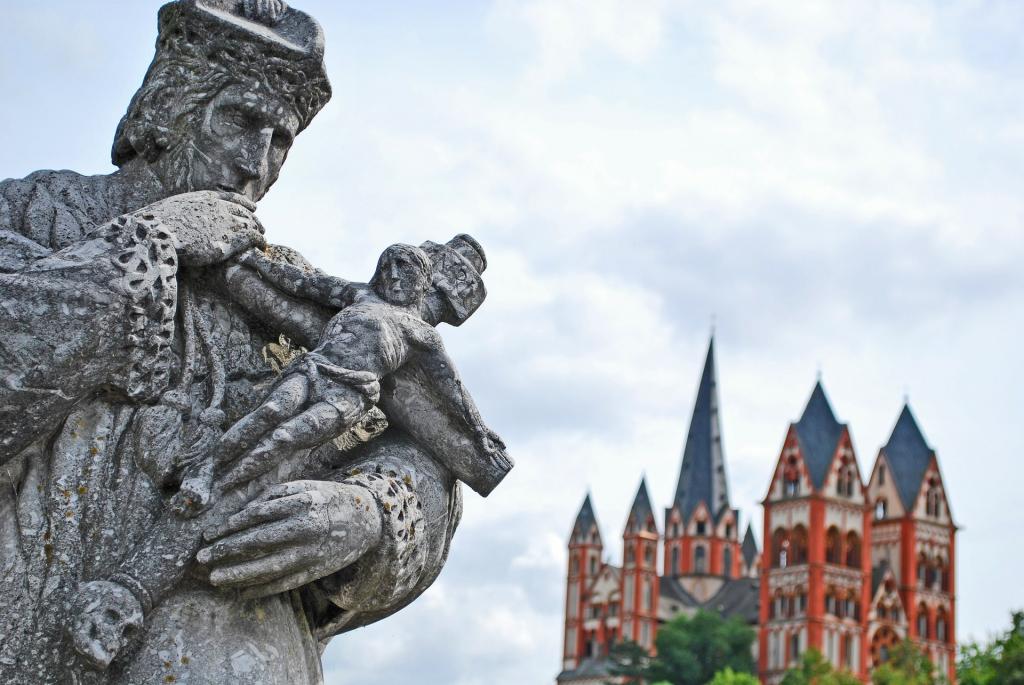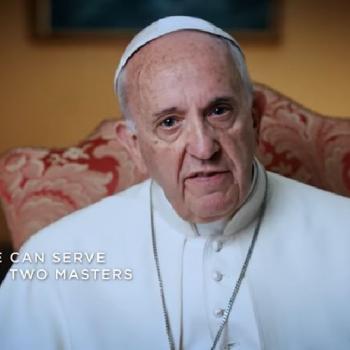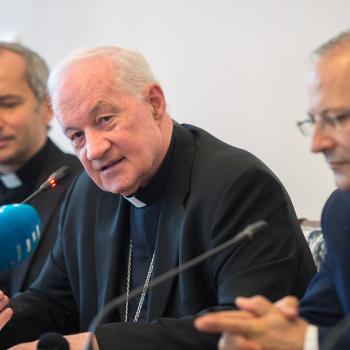
We need to speak of roots in the plural because there are so many. In this sense, when I hear talk of the Christian roots of Europe, I sometimes dread the tone, which can seem triumphalist or even vengeful. It then takes on colonialist overtones. John Paul II, however, spoke about it in a tranquil manner.
Yes, Europe has Christian roots and it is Christianity’s responsibility to water those roots. But this must be done in a spirit of service as in the washing of the feet. Christianity’s duty to Europe is one of service. As Erich Przywara, the great master of Romano Guardini and Hans Urs von Balthasar, teaches us, Christianity’s contribution to a culture is that of Christ in the washing of the feet. In other words, service and the gift of life. It must not become a colonial enterprise.
– Pope Francis, interview with La Croix, May 17 2016
Two different visions in the last couple of weeks of the role the Church is called to play in the Europe of the twenty-first century.
One, from the bishops of the continent (the CCEE) in their assembly in Minsk, calling for the word of Jesus to again “reach the heart of Europe”. And two, from Olivier Poquillon, Secretary General of COMECE – the Brussels-based Commission of the Bishops’ Conferences of the European Community – calling for a “dialogue… for the common good” between the Church and the State. And this last ahead of the “Rethinking Europe” conference to be held in Rome later this month.
Evangelization, then, or service. How best can the Church in Europe serve a society still suffering the effects of an ongoing crisis of identity intensified by political, social, cultural, and economic factors?
Defining “evangelization” and “service”
On the one hand, the option of (re-)evangelization supposes, according to the CCEE, “find[ing] the paths for the voice of the Lord Jesus to return to the ears of European men and women in culture and society”. What makes it necessary? That “the Gospel of Jesus is the perennial source of European history, of its humanist civilization, democracy, human rights and responsibilities. And therefore the most secure guarantee!”
On the other hand, the option of service, which supposes this dialogue – as Poquillon describes it – “not for the benefit of the Church, or the politicians”, but for all. “Trying together to reach solutions to the challenges we are facing today… for the common good”. What justifies it? The conviction that “going back to a world closed in on itself, going back to particularisms, is not possible”, as Cardinal Reinhard Marx put it in May. “We are called to move forward, and to do so together”, added the archbishop of Munich and Freising.
The tools of the two ways
The path of evangelization supposes the “encouragement” of the Church to the peoples of Europe “to react to the strong lure of secularism which tempts us to live without God and to confine Him to the private sphere, feeding the seed of individualism and generating loneliness”. The key index of its success, according to the European bishops, is “openness to life in any stage of progress”. Or to put it more specifically: “… the birth rate is the best index of the state of health of society”.
But beyond this conviction that “the deep and living root is Christ who speaks to the hearts and minds of everyone on this continent so they may be able to find their calling, beyond politics and economics”, the path of service – as outlined by Cardinal Marx – proposes that “the guidelines for the future are those of the Social Doctrine of the Church”. Subsidiarity: “understanding when it’s important to take decisions at the European level and when instead it’s more productive for these decisions to be taken at national level”. And solidarity: the recognition that “if, for example, we have no idea about how to solve the problem of unemployment in countries like Italy and Spain, Europe as a whole will struggle to have a future”. Cardinal Marx’s comments here bear reproducing in full:
Nobody can say “this is a problem that doesn’t concern us” because it’s a common problem. Europe’s development must repose on a solid social pillar for if people have no prospects, if [young people] can’t find a job, if families find it hard to build their future, they will stop believing in the European project.
Problems with the option for evangelization
In the light of the option for dialogue and service, then, three principal problems emerge with the option for evangelization.
1. Europe belongs to all
One: that as Cardinal Marx recalls, echoing Jean Monnet, “Europe is a project to create a better world”. “It’s simple, not ideological, and not romantic. It’s an idea, a powerful idea”. A recognition that would seem to put paid to the conviction borne out of the option for evangelization that the Gospel and the Gospel only is the “perennial source” of European history, humanism, democracy and human rights and responsibilities.
2. “Politics and economics” or “transcendence”?
Two: that the option for evangelization shies away explicitly from an engagement with “politics and economics”, or at least expects that “the openness of religion to transcendence” will do away by divine fiat – or by the adoption of “pro-life” laws and policies – with the concerns the European bishops feel with phenomena such as “the liquid culture we all breathe and the widespread individualist exasperation generating uncertainty and loneliness as well as some conflicts and injustices which wound the great gift of peace”.
3. Looking to history or to the future
And three: that the re-evangelization of the continent looks back to history for its principal inspiration, or maximum expression, whereas service and dialogue look forward. And this, importantly, with two tools – subsidiarity and solidarity – which are already part of the European lexicon. To quote from the Eur-lex website:
The principle of subsidiarity is defined in Article 5 of the Treaty on European Union. It aims to ensure that decisions are taken as closely as possible to the citizen and that constant checks are made to verify that action at EU level is justified in light of the possibilities available at national, regional or local level.
The Solidarity clause, introduced by Article 222 of the Treaty on the Functioning of the European Union (TFEU), provides the option for the EU and EU countries:
· to act jointly;
· to prevent the terrorist threat in the territory of an EU country ;
· to provide assistance to another EU country which is the victim of a natural or man-made disaster.













